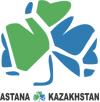Astana, 21st September.
After two intensive days of exchange, discussion and inspiring presentations the 3rd international conference was closed by Gerald A. Herrmann, director of Organic Services and Peter Brul, senior consultant of AgroEco/ Louis Bolk Institute by presenting the conference declaration that was passed by the 120 participants from 18 countries who came to Astana, Kazakhstan from September 17-18, 2010. More than half of the participants came from Central Asian countries, the rest from other former CIS countries like Ukraine, Albania, Georgia or the Czech Republic, but also from Turkey and some Western European countries.
FAO estimates that about 75 % of the genetic diversity of agricultural crops has been lost in the last 100 years. Scientific evidence supports that organic farming is the best solution for feeding the world’s population while maintaining a rich biodiversity in agriculture, agricultural landscape and natural resources. In the international year of biodiversity, the 3rd International Conference on the organic sector development focussed on the relation between organic agriculture, biodiversity, rural development and eco-tourism.
With holding the conference in Astana, the organizers deliberately decided to strengthen the movement in a region where organic is just emerging as a solution compared to Georgia and Ukraine, where the two previous conferences were held. In Kazakhstan, like in its neighbouring countries there are only very few certified organic farms and even less manufacturers. Markets are mostly export oriented as domestic markets are non-existent or in their very early development.
Enthusiastic conversations during lunch and coffee breaks confirmed by the overall positive feedback from the evaluation forms that the conference was very successful. Participants could not only listen to organic experts and learn from experiences of other participants, but also share their visions on how to further develop the organic sector in their region. Networking was highlighted as equally important as the information gathered.
A total of 43 speakers in ten parallel and six plenary sessions were presented during the conference. Papers of all speakers compiled in English and Russian in the conference proceedings were given to the participants to support dissemination of knowledge.
After the opening of the conference by Evgeniy Klimov of FIEC, Mrs. Aigul Zharylgassova, representative of the EU delegation in Central Asia introduced its activities concerning environmental protection programmes in the region and expressed the importance of organic agriculture for the region as well as the EU delegation’s appreciation of the conference.
Elene Shatberashvili, representing 2009’s organizer from Georgia, shared the Georgian experience in developing a national organic law and emphasized the importance of translating the term “organic” into the respective national language to make it understandable for domestic customers. In the session which presented country cases, but also during discussions in other sessions as well as in the plenary, the importance of establishing national ‘Action Plans’ was highlighted. Several speakers considered them to be more important than an early regulation of the sector. Awareness raising campaigns on organic, sustainable production methods for farmers, food security and healthier food campaign for consumers should be supported by governments and international institutions.
During the closing session papers of how to strengthen and to complement the organic sector development were presented. Nelleke Veenstra of Triodos Bank introduced options of trade financing available for producers without involving of an interim bank. Dr. Hartwig Mennen of LOGO e.V. presented different options to learn by working on organic farms in Germany and other countries. About 250 trainees from former CIS countries are participating in the exchange programme of LOGO each year.
Following the conference, about 35 participants joined the excursion to the Korgalzhyn Nature Reserve located at about 150km west of Astana. The wetland area is home to 443 plant species and habitat for fish, reptiles, mammals and 340 bird species and plays an important role in the east African-Siberian and the Asian bird migration routes. For these reasons, Korgalzhyn was included in the international Living Lakes network, in the Ramsar List of wetlands with global significance, but also in the UNESCO list of global heritage sights. Participants could learn about the wetland in the visitors’ centre, and enter the nature reserve as one of only 15 groups allowed per year.
After being hosted by several eco-tourism farms and having enjoyed local food and music the excursion continued on the second day with visiting four farms respectively project sites. All farms are located in the buffer zone that surrounds the nature reserve. Around the villages, overgrazing of grasslands is evident, because cattle are just left out of the farmyard everyday and go grazing near to the villages. Generally, in the semi-desert region water is the restricting production factor as is the decades’ long exploitation of soils during and after Kolkhoz agriculture. By building dams holding back water of a small creek for some more weeks during growing season, production of 600ha ‘steppe’ (grassland) could be tripled compared to the year before and 10 times more compared to neighbouring farms, this way producing significantly more hey for the winter feeding period.
Other improvements could be observed by participants on arable land projects with the introduction of simple crop rotations of Alfalfa and application of organic manure or compost to increase wheat yields (16 to 18% raw protein) which are as low as 150-300kg/ha in the very dry year 2010 (regular yields amount around 1 ton). So far, cattle manure has been considered waste and not as fertilizer, therefore recycling and sometimes composting is introduced to give manure attention and value.
Participants of the two day conference as well as of the excursion highlighted the perfect organisation of both events and the high quality of programme and speakers. Having selected Kazakhstan as one of the Central Asian countries, which are generally considered too remote for being chosen of hosting such events was applauded as well.
Further information:
Susanne Krause
Phone: +49 89 820759 05
Email: s.krause@organic-services.com
www.conference.organiccenter.kz

